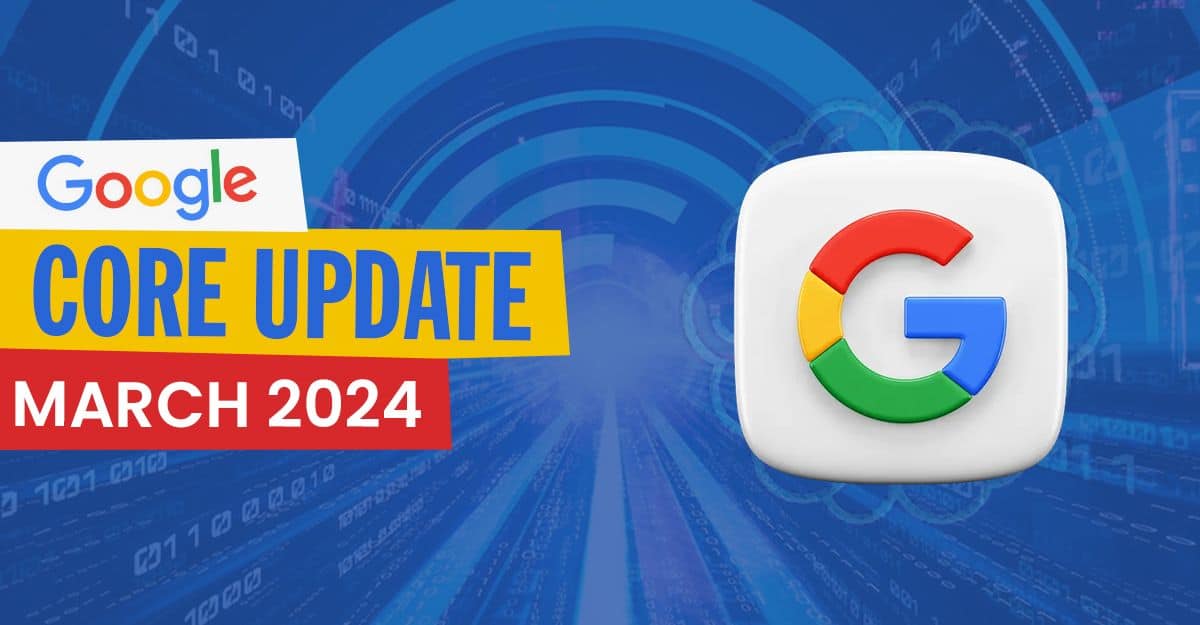Google’s March 2024 core update that started rolling out on March 5, 2024, finished on 19 April 2024. This update targeted the reduction of low-quality and unoriginal content, explicitly focusing on decreasing content created primarily for search engine optimization rather than user benefit.
As per Google’s announcement, the March 2024 core update will require over a month to complete implementation. Its primary goal is to diminish unhelpful content by 40%, a significant objective. Nonetheless, history suggests that such reversals are not without precedent in past updates. Moreover, Google has introduced a complementary spam update, enforcing penalties in line with the most recent spam guidelines.
Understanding the specifics of the March 2024 update holds paramount importance for any website owner or manager. It goes beyond merely surviving in the competitive digital landscape; it’s about capitalizing on the update to your advantage. This necessitates a thorough examination of how your website aligns with the update’s focal points and identifying actionable steps to enhance your site’s performance.
SEO professionals are currently assessing the overall impact of the update cautiously, refraining from rushing into recommendations. It’s prudent to avoid making significant changes until the update is fully implemented.
Presently, there isn’t notable volatility in the SERPs, but certain industries have felt the effects of the update. The accompanying image provides an overview of which sectors have experienced impacts thus far.
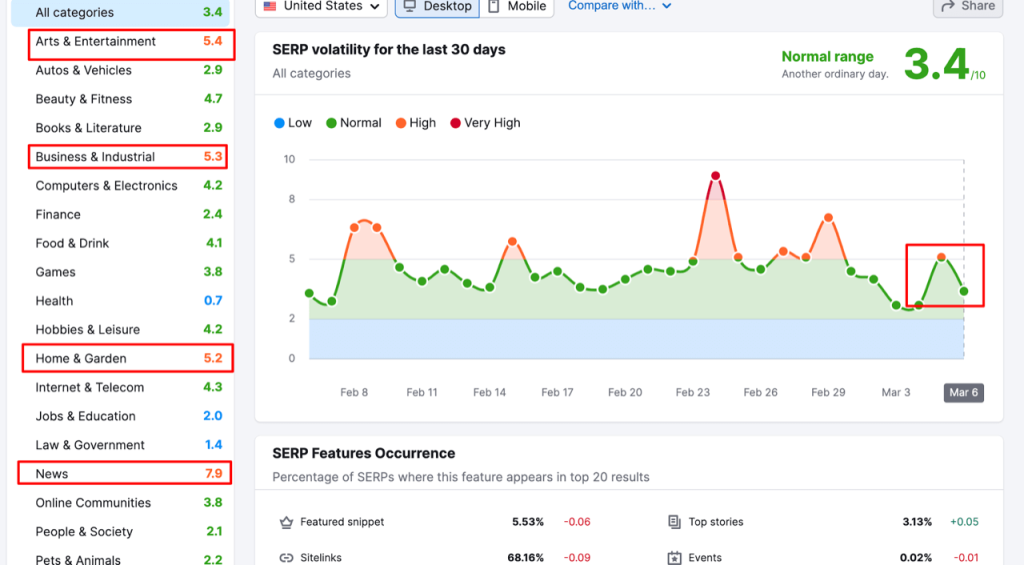
Using the image as a preliminary guide, it appears that specific verticals, particularly publishing sites, tend to host more content flagged as spammy or unhelpful by Google. Let’s delve deeper into the implications of this update and how these modifications impact websites.
March 2024 Core Update
The March 2024 core update signifies a notable departure from past updates, characterized by its intricate nature and modifications across multiple core systems. This update also denotes a shift in how content helpfulness is assessed.
By integrating various innovative signals and methodologies, Google has refined its core ranking systems to deliver more beneficial results. Google now utilizes multiple systems to evaluate reliable information instead of relying solely on a single signal or system. To clarify these changes, a new FAQ page has been introduced.
Due to the complexity of this update, its rollout may extend over a month. Expect fluctuations in rankings to be more pronounced compared to regular core updates, given the comprehensive updating of diverse systems. Notification of the update’s completion will be provided via the Google Search Status Dashboard.
Content creators need not take any new or special actions for this update if they consistently produce satisfactory content for human consumption. However, those facing challenges with their rankings are encouraged to carefully review Google’s guidance on creating valuable, reliable, people-centric content.
Leverage professional SEO services to effectively navigate and conquer the challenges posed by the March 2024 Core Update.
Enhancing Search Quality
The March 2024 Core Update significantly improves Google’s ranking systems through algorithmic enhancements. Elizabeth Tucker, Google’s Director of Product for Search, underscores the importance of presenting relevant information while minimizing unoriginal content. This update represents a continuation of Google’s ongoing efforts since 2022 to address unhelpful content.
Google’s core ranking systems now integrate advanced signals to identify unhelpful webpages and enhance user experiences. Content creators are encouraged to prioritize user-centric content over SEO manipulation, stressing the significance of providing value, meeting user needs, and offering genuine assistance in content creation.
The refined ranking systems strive to differentiate between user-focused content and SEO-driven material. Consequently, updates may lead to fluctuations in rankings as various core systems are strengthened, underscoring the necessity for continuous website optimization and digital marketing strategies. Prioritizing high-quality, user-centric content can elevate search engine rankings and improve digital marketing effectiveness.
Enhancing search quality entails
- Crafting valuable, user-centric content that addresses audience needs.
- Improving website structure and navigation to enhance user experience.
- Employing strategic keyword usage for effective search engine optimization.
- Optimizing website loading speed to minimize bounce rates.
- Securing high-quality backlinks to enhance credibility and ranking.
Aligning with the March 2024 core update can significantly enhance online presence, search ranking, and organic traffic.
| Features of the March 2024 Core Update | Implication for SEO |
| Enhanced search result relevance | Focus on creating high-quality, informative content that addresses user search intent |
| Improved website user experience | Improve website structure, navigation, and mobile-friendliness for better user engagement |
| Decreased impact of spam tactics | Build high-quality backlinks through guest posting on reputable sites and earning natural links |
| Amplified visibility for trustworthy content | Conduct thorough keyword research to target relevant terms and optimize content for those keywords. |
Helpful Content Update Now Part Of Core Updates
With the March 2024 core update, Google has ceased the practice of formally announcing new updates regarding helpful content. This decision comes as a result of integrating the helpful content system into the core update system, rendering such announcements unnecessary.
This the most recent notable adjustment to September 2023 Helpful Content Update, affecting numerous websites. While there is optimism that some of the sites impacted by this update may see improvements with the March 2024 core update, definitive outcomes remain uncertain at this juncture.
The classifier for the helpful content system has undergone extensive restructuring and integration into the March 2024 core update.
It’s worth noting that the March 2024 core update encompasses more than just enhancements to the helpful content classifiers. Google has indicated that work on this update commenced with the 2022 helpful content update.
In instances where rankings experience a decline, Google has previously offered the following guidance:
- No specific actions are recommended for recovery; a negative impact on rankings does not necessarily signify issues with your pages.
- Assess the quality of your content by addressing specific queries.
- Exercise patience and await another core update; while minor enhancements may occur between updates, significant changes typically accompany subsequent core updates.
Essentially, the focus should remain on prioritizing creating helpful content for users rather than solely concentrating on search engine rankings.
March 2024 Spam Updates
Google’s March 2024 update introduces new spam policies targeting three key areas:
- Expired domain abuse: Google aims to combat the manipulation of search rankings through the purchase of expired domains, ensuring better visibility for genuinely valuable websites.
- Scaled content abuse: The update targets the proliferation of unoriginal content created solely for ranking purposes, elevating original and valuable content while reducing the visibility of low-value content.
- Site reputation abuse: Hosting third-party content without adequate oversight to manipulate search rankings is addressed, promoting trustworthiness and reliability in search results.
These policies are integral ranking factors in the March 2024 update and reflect Google’s commitment to improving the search experience by rewarding adherence to best practices and delivering high-quality, relevant content.
Website owners must comply with these spam policies to maintain or enhance their search visibility. Focusing on producing valuable, original content and avoiding manipulative practices ensures alignment with Google’s algorithm changes and ranking guidelines.
Wikipedia’s visibility has decreased by 697 VI points following two recent updates, though it still maintains a strong presence. Noteworthy is the 25% decline in visibility experienced by goodhousekeeping.com, marking its lowest point since 2019. These decreases in visibility are evident across the entire domain, as shown in the accompanying graphic.
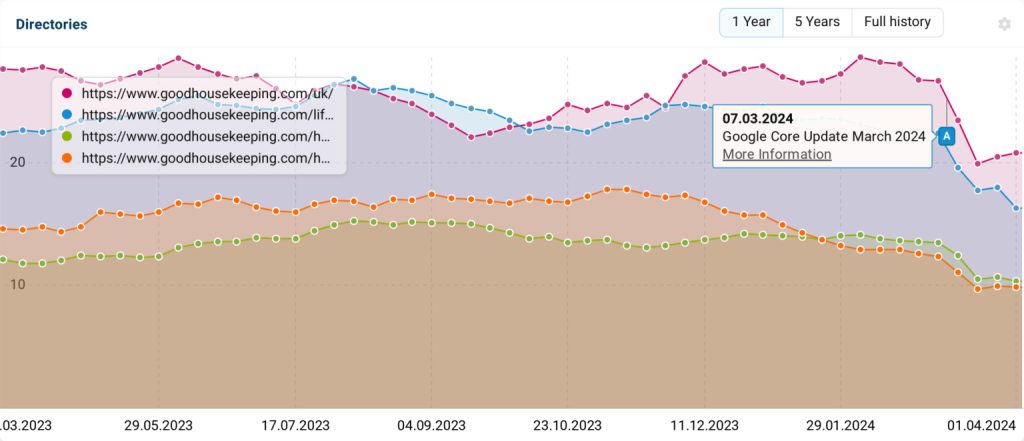
Regarding recent queries about Google’s announcement of new spam policies, Aleyda Solis, an SEO Consultant, clarified on Twitter that action is indeed being taken, emphasizing the importance of adherence to these updates.
| Feature | Explanation |
| Enhanced search result relevance | The spam policies work towards diminishing the prominence of inferior and unproductive content, thus ensuring users encounter more pertinent search results. |
| Improved user experience | Through the imposition of penalties on manipulative tactics, the spam policies actively contribute to an enhanced overall user experience by fostering the dissemination of dependable and valuable content. |
| Heightened trustworthiness | Websites that align with spam policies and consistently generate superior content are positioned to be perceived as more credible entities by both users and search engines. |
Expired Domain Abuse
Google has updated its policy to classify expired domain abuse as spam. Expired domain abuse involves purchasing expired domains to enhance the search ranking of low-quality content. This practice can deceive users into believing that new content on a domain is associated with the previous site, even when it is not.
Content creators are cautioned explicitly against acquiring expired domains to repurpose them for Google Search ranking. Google will take action against expired domain abuse this week, utilizing both algorithmic spam detection systems and manual interventions.
Scaled Content Abuse
Google has consistently upheld a policy against the use of automation for generating low-quality or unoriginal content in bulk, aimed at manipulating search rankings. Initially, this policy focused on instances where automation was clearly involved in content creation.
However, as methods for scaled content creation have evolved, discerning whether the content is solely the result of automation has become more complex. In response to these advancements, Google is reinforcing its policy to specifically target this abusive behavior—producing content at scale to artificially inflate search rankings—regardless of whether it involves automation, human effort, or a blend of both.
This updated approach will empower Google to take action against a broader range of content lacking in value that is mass-produced, such as pages falsely claiming to offer solutions to popular searches but ultimately failing to provide helpful information.
Site Reputation Abuse (aka Parasite SEO)
Google has introduced a new policy to combat site reputation abuse, also known as “Parasite SEO,” where third-party sites host low-quality content to benefit from the ranking authority of trusted sites.
According to Google, third parties might publish payday loan reviews on reputable educational websites to boost their own rankings, potentially confusing or misleading visitors.
This policy targets third-party content created solely for ranking purposes without oversight from the website owner, which is considered spam. However, not all third-party content violates the policy; content with close oversight, like native advertising or advertorial, typically doesn’t.
The new policy is aimed at addressing site reputation abuse, as detailed on Google’s spam policies page. Google has announced a two-month advance notice period, during which both automated and manual actions will be taken to combat such abuse, with implementation commencing on May 5th.
In terms of ranking signals, Google primarily focuses on page-level signals, with minimal consideration for third-party reputation or authority scores.
For sites with coupon areas created with third parties, Google states that active involvement in producing the coupons exempts the content from being blocked in Google Search. Readers should understand how the publication sources its coupons for value assurance.
Google emphasizes that the goal of these policies and constant improvements to spam-fighting systems is to ensure users receive great, helpful content and to prioritize the success of those producing helpful content in Search over those engaging in spam.
Also Read: Google’s Update E-A-T — How it Affects Your Industry (and What to do about it)!
Impact Of SEO Tactics On Website Ranking
The March 2024 core update and spam policies substantially impact SEO strategies and website ranking. Grasping the implications of these updates and adjusting your digital marketing strategy accordingly is paramount for SEO professionals.
The core update strives to bolster SERP quality, while the spam policies aim for manipulative practices. Content creators must prioritize crafting high-quality, trustworthy content that prioritizes user needs. Adhering to Google’s ranking criteria can amplify your website’s visibility and enhance its search engine rankings.
For instance, HMRC.gov.uk demonstrates a substantial domain victory, notably advancing in the forum. Additionally, it secures a position within the top 25 for absolute visibility gains. Refer to the live Visibility Index history for this directory below.
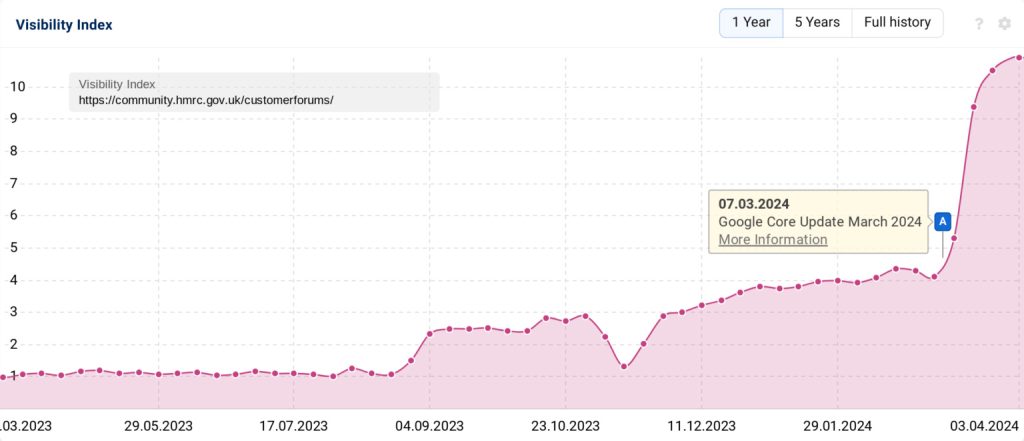
Conducting an SEO impact analysis is critical during this phase to gauge the quality of your content. Scrutinize your website’s pages meticulously to pinpoint any necessary revisions or enhancements. By making data-driven decisions and enacting requisite changes, you can optimize the benefits of the update.
Anticipate fluctuations in rankings during the rollout of the March 2024 core update, but refrain from making significant alterations until the next core update emerges. Exercise patience to accumulate more data and assess the update’s enduring impact on your website’s performance.
Staying informed about Google’s guidelines and best practices is pivotal for adapting your SEO strategies. Keep abreast of the latest industry trends and algorithmic shifts to ensure your website sustains or augments its search visibility.
Also Read: Unlock 2024’s Top SEO Trends: Start Implementing Today for Maximum Visibility!
Navigating The March 2024 Core Update: Expert Strategies
In response to Google’s March 2024 core update, it’s essential to prioritize the creation of high-quality content that meets user needs and aligns with Google’s ranking criteria. This involves adhering to new spam policies to avoid manipulative tactics that could harm website rankings. Regularly monitoring rankings and making necessary adjustments is key.
Emphasizing user experience by optimizing website performance, speed, and mobile responsiveness is crucial for attracting organic traffic. Conducting a content audit to ensure existing content aligns with the update, updating information, and integrating relevant keywords naturally is essential. Staying informed about future updates is necessary for effective SEO strategies.
The Impact Of The Core Update On Websites
The March 2024 core update may prompt fluctuations in rankings as the new algorithm adjusts to changes. It’s crucial to maintain composure and avoid overreacting to temporary drops in rankings, as such fluctuations are typically inherent in the update process. Instead, focus on diligently monitoring the performance of individual pages and making necessary adjustments to align with the new ranking signals.
Conducting a thorough analysis of competitors and identifying fluctuations in their ranking positions can provide valuable insights. This analysis forms the basis for informing future SEO strategies and discovering improvement opportunities. The March Core and Spam update notably highlights Quora and Reddit as beneficiaries.
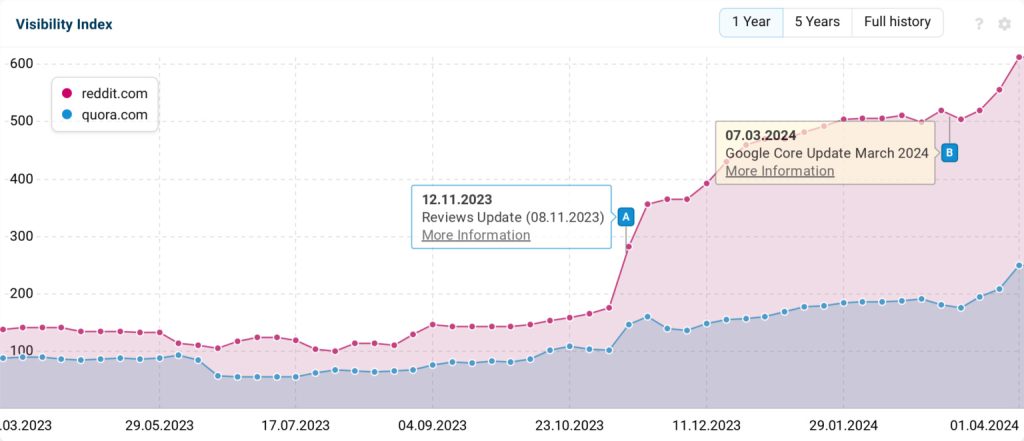
Furthermore, conducting a comprehensive analysis of competitors and identifying areas where they may have gained or lost ranking positions can yield valuable insights. This analysis can serve as a foundation for informing future SEO strategies and uncovering opportunities for improvement.
Matthias Kroeger, a Software Developer, cautions about forthcoming challenges for AI-generated content following Google’s March 2024 core update. This update prioritizes genuine content over clickbait, introducing stringent spam policies targeting expired domains and content scaling. Web creators are advised to prioritize people-first content to ensure a cleaner and more reliable search experience.
Here are the best practices recommended for immediate implementation:
Step 1: Focus On High-Quality Content
- Evaluate and Remove Unhelpful Content: Remove redundant or low-quality content generated by AI or humans. Ensure deleted content returns a 410 “Gone” status for proper handling.
- Prioritize User Value: Look beyond keywords. Assess how your content addresses specific problems, offers unique insights, and maintains clarity, conciseness, and engagement for your target audience.
- Human Oversight: Even with AI tools aiding content creation, ensure human oversight and editing to reflect genuine expertise in your field.
- Cite Credible Sources: Support your content with reliable data and sources to establish credibility and authority in your niche.
Step 2: Build Expertise, Authoritativeness, And Trustworthiness (E-A-T)
- Provide Expert Content: Have experts in the field author your content to build trust and credibility.
- Back up Content with Credible Sources: Support claims with credible data and references to position yourself as a reliable source of information.
- Establish Authority: Showcase author credentials and qualifications prominently to reinforce your expertise and authority.
Step 3: Implement Schema Markup
- Utilize Schema Markup: Use schema markup to enhance search engine understanding of your content, employing relevant types such as FAQ, How-to, and Review.
- Choose Appropriate Schema Types: Select schema types that accurately represent your content to improve its visibility and relevance in search results.
- Ensure Proper Implementation: Use tools or plugins to implement schema markup correctly, ensuring validity and error-free execution.
Step 4: Update And Refresh Existing Content
- Regular Content Updates: Keep existing content fresh and accurate by scheduling regular updates based on industry trends and user queries.
- Incorporate User Queries: Address user needs by including relevant questions from Google’s “People Also Ask” section and providing concise answers.
- Maintain Relevance: Schedule regular content updates to sustain your website’s relevance and improve search performance.
By following these practices, you can enhance your website’s overall quality, credibility, and search visibility. Stay informed about the latest Google SEO guidelines, as updates can impact your optimization strategies over time.
March 2024 Core Update: Fluctuations, Spam Rollout Conclusion, And Ongoing Impact On SEO
Update – 10-04-2024
The rollout of the March 2024 Core update is ongoing, causing fluctuations in rankings, as reported by SEOs and discussion forums. The SEO community anticipates that this signifies the final stages of the rollout, with Google likely to declare its completion by the end of this week or early next week. Notably, the March 12th update reveals changes in the SERPs exceeding normal noise levels, particularly affecting large, established domains.
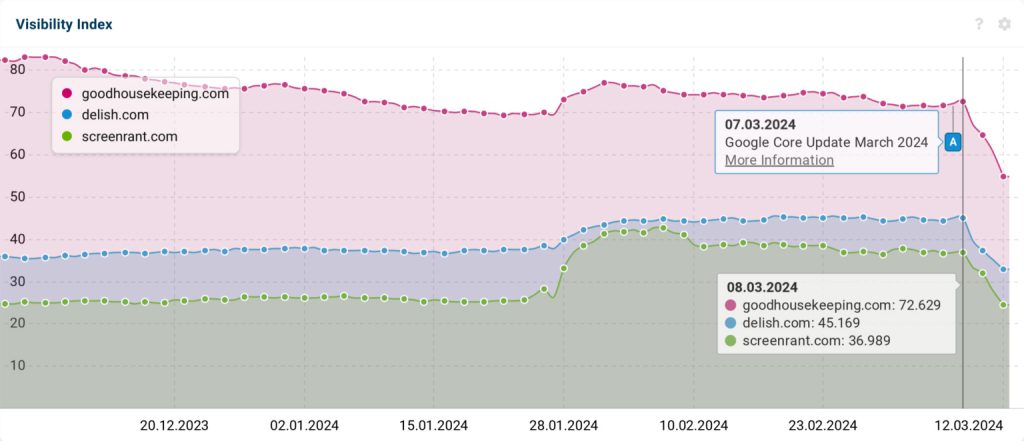
While losses are evident, identifying gains is proving more challenging. This suggests an algorithm update focused on eliminating URLs rather than promoting them. Any gains achieved post the removal of ranking URLs would be dispersed widely as the search results realign, a trend that may evolve as updates continue to roll out.
Google officially announced the completion of the spam update that commenced on March 5, on March 20, 2024. Lasting for 14 days and 21 hours, this update represents a significant advancement in Google’s ongoing efforts to enhance search quality and combat spam. While some websites have managed to recover from pure spam manual actions, many are still working to restore their presence on Google search results.
Meanwhile, the March 2024 core update progresses and is expected to continue unfolding over the coming weeks, refining Google’s search algorithms and impacting search results globally.
Google has confirmed the successful conclusion of the spam update rollout in its latest announcement on March 20, 2024. Further updates can be anticipated as the core update continues, shaping the search landscape and influencing SEO strategies.
Downplaying Links
Google once considered links a crucial ranking factor for evaluating web page relevance. However, Gary Illyes of Google, speaking at Pubcon Austin 2023, stated that links no longer rank among the top three signals for ranking.
A recent update to Google’s Spam policies documentation confirms Illyes’ statement. The document now indicates that Google uses links to determine web page relevance. Notably, the term “important” has been omitted from the document’s previous version, suggesting that links are now just one of several factors considered in assessing relevance.
While this change may seem ambiguous under typical circumstances, it becomes more significant in light of the complex core update launched in March 2024.
This shift potentially indicates a reduced emphasis on links as a primary ranking signal, which could have significant implications for link-building strategies in the future.
Content Focused On Link Manipulation Is Ineffective
Google has updated its spam policies to prohibit the creation of low-value content for link manipulation. This includes generating low-quality content precisely to manipulate linking and ranking signals, which Google considers link spam.
As a result, Google is anticipated to crack down on unfair tactics like setting up Private Blog Networks (PBNs) to manipulate links, aiming to improve the overall quality of search results.
New Signal Focused On Outgoing Links
Google has maintained a consistent stance on outgoing links: websites selling such links are subject to penalties. However, a noteworthy development has been regarding Google’s algorithm’s assessment of outgoing links.
Google now explicitly cautions against any efforts to manipulate search rankings through outbound links, classifying such actions as link spam. This announcement represents a notable change in Google’s strategy, indicating its intention to penalize sites that engage in manipulative practices to gain SEO benefits. Website owners need to be vigilant to prevent potential penalties by following Google’s guidelines on linking practices.
Understanding The March Core Update
Analyzing and disseminating insights about impacted websites demands consistent observation and detailed analysis. It would be advantageous to include the site in this process. Educational and publicly available videos will be created.
Concerning sharing the site for analysis:
- There’s a pressing need for more proactive assistance for website owners affected by recent Google updates, such as HCU(Helpful Content Update) and the March Core updates. Google’s lack of support for site owners grappling with the aftermath of these updates is a source of frustration.
- Creating genuinely valuable content requires significant effort and a deep understanding of one’s audience. Without guidance from Google, site owners may find themselves navigating uncertain terrain, relying on intuition and profound audience insights to deliver unique value.
A comprehensive analysis is necessary to grasp the factors contributing to success amidst updates. This signifies a significant shift in the industry, necessitating thorough examination and adaptation.
Key Areas Of Focus For Those Affected
Google has updated its guidance on diagnosing traffic declines, providing valuable insights. Minor drops, like moving from top position 3 to top 10, may result from normal ranking fluctuations and may not require immediate adjustments. It’s essential to recognize that what some interpret as the impacts of recent updates could just be regular ranking changes.
However, substantial drops in position, such as falling from the top to the bottom of the same SERP page, lead Google to recommend a self-assessment of your website. Ensure that it prioritizes user utility, reliability, and user-centricity.
The update radar indicates daily changes in SERPs detected during the core and spam update period.
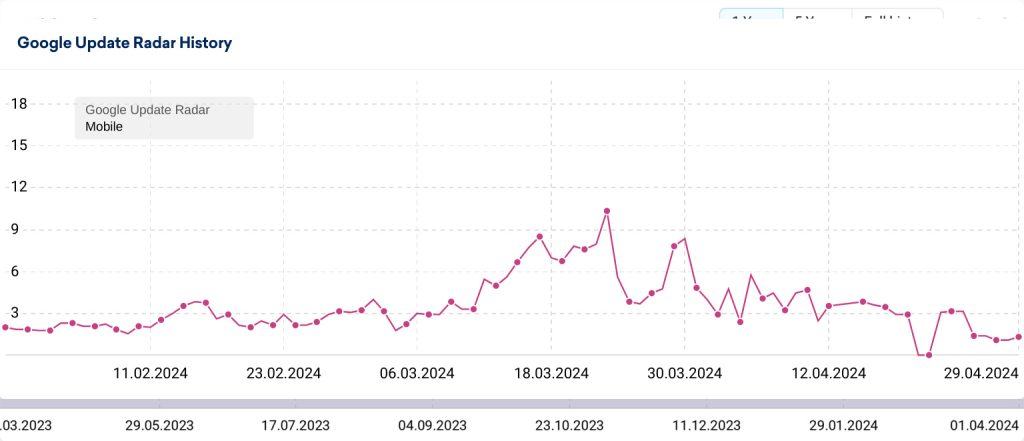
The Significance Of Being Helpful, Reliable, And Prioritizing People
Previously, it was thought that Google’s documentation outlined priorities for their systems. However, it’s now understood differently. The questions provided aren’t direct criteria for the systems but reflect what users find helpful. User engagement signals guide content predictions.
After studying Google’s AI extensively, it’s clear that user preferences drive search outcomes. This insight prompts further exploration. While complex, efforts are made to distill these concepts effectively.
How Does The Search Functionality Work?
Google uses various user signals, such as clicks and scrolls, to enhance its machine-learning algorithms, thus refining the quality of search results. Quality raters play a role in this process by evaluating search rankings, which contributes to the ongoing refinement of the system.
The Freshness System is responsible for identifying relevant content by analyzing user interactions. Factors such as clicks, scrolls, and shares influence recent updates, affecting website rankings. Personal actions like bookmarking or sharing content indicate user satisfaction with search results.
To address the impacts of updates, it’s vital to prioritize aligning content with user preferences and demonstrating its relevance. Ultimately, convincing users, rather than just Google, of the value of the content is crucial.
Step Into The Perspective Of A Searcher
Various resources will soon be accessible to support our learning journey. These resources include a book, workbooks, and a comprehensive course, all tailored for individuals seeking to expand their knowledge.
Moreover, there will be videos examining the implications of this update. Throughout the past year, significant effort has been invested in developing these resources, spurred by the acknowledgment of the ever-changing search environment and the necessity for widespread industry adjustment and education.
Adapting To Evolving Google Algorithms
Recovering from a Google core update requires diligent effort, especially with the March update presenting a significant challenge. E-A-T (Expertise, Authoritativeness, Trustworthiness) holds great importance, with a preference for authoritative sources. Re-establishing rankings becomes challenging when established authorities dominate search results. Focusing on unique knowledge and topical authority is crucial to capitalize on opportunities.
Relevance is pivotal, as updates reflect Google’s evolving understanding of usefulness. It’s essential to analyze why similar sites rank higher and strive to offer superior value through original and insightful content.
While traditional SEO factors remain essential, recent updates prioritize user satisfaction signals, potentially reducing their significance. Consistently delivering helpful content that users prefer is paramount for organic search performance. The significant impacts of recent updates raise concerns, indicating a shift towards user satisfaction signals in ranking systems. Comprehensive guidance will be provided through various content channels for affected websites.
Search Paradigm: User Satisfaction Over Algorithms
Search functions akin to a library, with Google assuming the role of the librarian and searchers determining the value of resources. This comparison originates from a previous discussion.
Google’s primary objective revolves around organizing global information for easy access. Web pages can be likened to books within an extensive library, subject to scrutiny by searchers. Traditionally, SEO strategies focused on impressing the librarian (Google’s systems), which could anticipate but not directly evaluate the usefulness of resources.
In the past, predictions were based on various signals, such as titles, headings, topics, entities, and links. However, with modern advancements in machine learning, user actions like clicks, hovers, scrolls, and revisits to search results are taken into account. Prioritizing user satisfaction over catering solely to the librarian is crucial in light of these advancements. The topic will be explored further in forthcoming materials, highlighting the importance of crafting content for searchers rather than solely for the librarian.
Additional Queries Regarding The Useful Content System
The helpful content system, initiated in 2022, has been operational for nearly two years. Recently, Google has incorporated this system into its core ranking algorithms, marking a significant development.
Several topics will be discussed in upcoming sessions:
- Is there still a site-wide classifier for HCU?
- Should efforts continue to focus on removing affected content? Google indicates that an abundance of unhelpful content may adversely affect other pages on the site. Removing such content could potentially improve the performance of other pages.
- Is there a possibility of observing an HCU recovery? A promising case is under examination, though declines may be more attributed to the October core update than the September HCU. This involves a site concentrating on noindexing numerous pages with minimal content. The site has authorized further examination and sharing of insights.
- Plans are underway to create a video demonstrating the approach to enhancing current content to ensure its originality and usefulness.
Analyzing Gemini 1.5 And Search
Following Google’s announcement of Gemini 1.5, a new AI technology, the March Core update does not seem coincidental. Unlike the Gemini Chatbot, Gemini 1.5 introduces a novel architecture based on a technology called a mixture of experts model (MOE), departing from the commonly used transformer architecture.
Google claims that Gemini 1.5 brings considerable performance enhancements, signifying a significant leap in their approach. These enhancements span research and engineering innovations across various model development and infrastructure aspects. Notably, Gemini 1.5 aims for improved efficiency in training and serving through its new Mixture-of-Experts (MoE) architecture.
This technology boosts the efficiency of all Google AI systems, allowing them to handle larger datasets effectively. Given that search operations heavily rely on AI systems, it’s clear that Gemini 1.5 has notably boosted Google’s utilization of machine learning for ranking.
In today’s landscape, optimizing for algorithms focused solely on signals like PageRank is outdated. Modern search algorithms integrate complex combinations of machine learning systems capable of processing numerous signals, potentially numbering in the hundreds or even thousands.
Analyzing Your Data In Relation To The Update
ChatGPT Plus users can utilize the Ranking Changes Scatter Plot GPT tool for analyzing GSC keyword rankings. This tool enables data export from GSC and creates scatter plots for visualizing keyword and page impacts. It’s crucial to acknowledge that its accuracy might fluctuate like any language model tool.
For individuals unsure about their website’s impact, there’s the algo update checker GPT. The developer is currently developing a complimentary guide to aid website owners in diagnosing Google update impacts. Users can experiment with the GPT, which delivers adequate answers derived from the developer’s analysis procedures and knowledge base.
Google Asserts: A 45% Decrease In Low-Quality Results
Google reports a 45% decline in low-quality search results, notwithstanding ongoing issues in search outcomes. As mentioned earlier, quality raters evaluate search results, classifying them as helpful or unhelpful.
As per documents from the DOJ vs. Google case, these evaluations contribute to an IS score, though the precise meaning of “IS” remains unspecified. It presumably indicates “Information Satisfaction.”
When raters judge search results as more helpful, IS scores rise. Google’s anticipation of a 45% decrease in low-quality, unoriginal content likely stems from this enhancement.
Google asserts that these improvements are relative to results preceding the introduction of the helpful content system in 2022. If you continue to encounter unhelpful search results, it’s because only 45% of them have been addressed. Expect further changes in the future.
How’s The Spam Update Going?
The March Core update coincided with Google’s announcement of a spam update. Several sites faced manual actions for issues like pure spam or thin content. These actions mainly targeted sites that overly relied on SEO tactics rather than resorting to blackhat methods.
Interestingly, even well-established sites that put considerable effort into content creation experienced effects. However, their content often lacked originality and depth, relying heavily on catering to search algorithms for previous success.
Between March 5 and March 20, discerning whether a site was impacted by the spam update or core update proves challenging. Conducting site reviews can yield deeper insights into understanding the impact. In instances of uncertainty, it is advisable to attribute any effects to the core update.
On March 8th, domains likely experiencing the effects of the Core and Spam Updates were identified. However, overall, significant movements are minimal. The stability of the Top 100 domains (UK and US) persists.
Identifying affected domains is not simple, but the provided samples display typical signs of an update, confirming the rollout of Google updates.
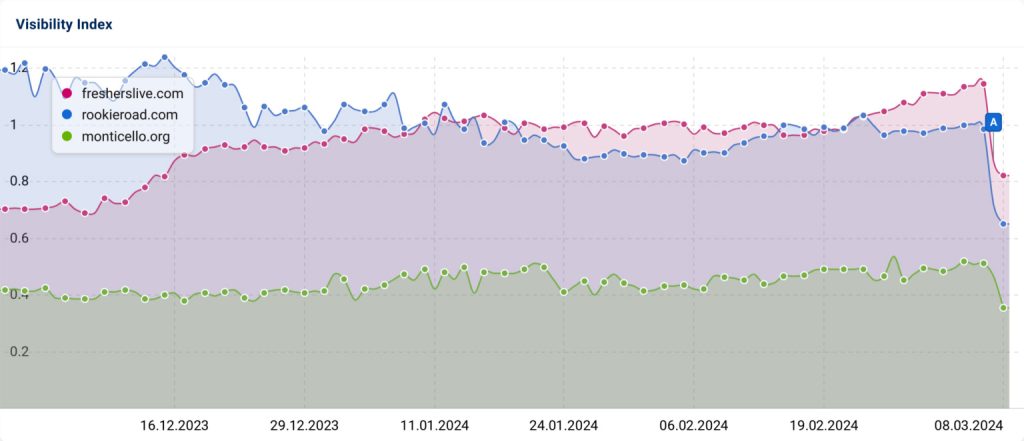
Getting Ready For Future Updates
The March 2024 core update is just one of many from Google. Staying informed about SEO updates and trends is crucial, and it is achieved through attending conferences and webinars and following reputable blogs. Engaging with the SEO community offers networking opportunities and insights into upcoming strategies. Adapting to new updates, focusing on user-centric content, and adhering to best practices are essential for maintaining website rankings amidst evolving SEO landscapes.
To Conclude
Amidst Google’s ongoing algorithm changes, prioritizing user value remains crucial. Creating informative and engaging content not only enhances search visibility and SERP rankings but also aligns with user-centric optimization strategies necessary for effectively adapting to these evolving algorithms. Looking ahead, SEO professionals should anticipate Google algorithm shifts and fluctuations in SERP rankings. We will keep on updating this post as we
If the recent update has left you puzzled about the performance of your site, don’t worry—PageTraffic is here to assist. We focus on optimizing your site’s health while strictly following Google’s standards. Discover how we can help by requesting your free analysis now!
FAQs
What type of content will benefit from the March 2024 Core Update?
Emphasize producing informative, well-crafted, and credible content that aligns with user search intent. Expertise, authority, and trustworthiness (E-A-T) are anticipated to remain significant factors.
What are the goals of the update?
Google aims to reduce “unhelpful” content by 40% and improve the overall user experience by surfacing high-quality, informative results.
What specific changes are being made to link signals?
In the realm of SEO, the importance of links might diminish relative to other ranking factors, as Google aims to address content that solely focuses on acquiring backlinks. New signals are being introduced to evaluate the quality and relevance of outbound links. The effectiveness of using expired domains for SEO purposes may decline gradually.
How should I prepare for the impact of the update?
Concentrate on producing high-caliber, informative content that genuinely benefits users. Steer clear of manipulative linking strategies and instead concentrate on naturally building backlinks.
